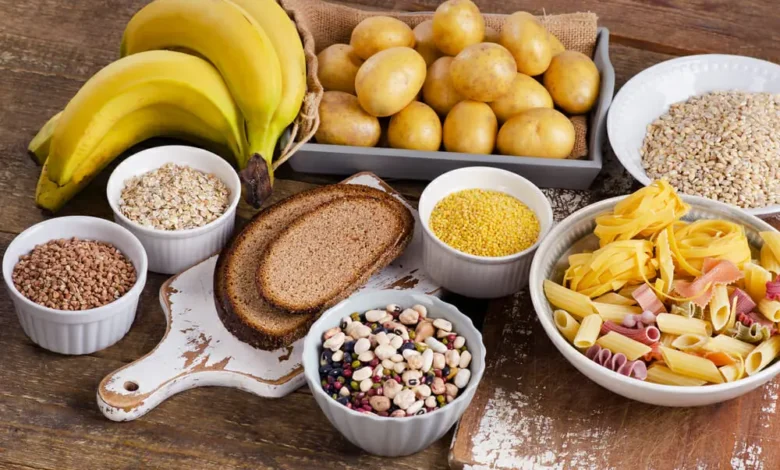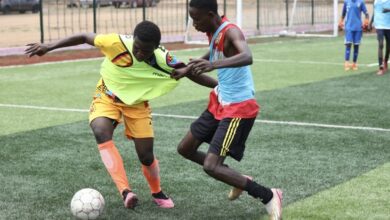The best foods to eat as a footballer

Football is a physically demanding sport that requires strength, speed, endurance, agility, and mental focus. To maintain all of that, footballers need the right balance of carbohydrates, proteins, healthy fats, vitamins, and hydration.
Let’s look at the ideal foods that keep footballers at their peak — and why they matter.

1. The Key Principles of a Footballer’s Diet
A footballer’s diet must focus on fuel, recovery, and performance.
Fuel: Energy to run, sprint, and maintain stamina during training or matches.
Recovery: Repairing muscles after games or workouts.
Performance: Supporting brain function, coordination, and focus.
To achieve these, you should balance your intake of macronutrients and micronutrients.
Macronutrient Breakdown:
Carbohydrates: 50–60% of total diet (energy supply)
Protein: 15–20% (muscle repair and growth)
Fats: 20–25% (long-lasting energy and hormone balance)
2. Best Carbohydrates for Footballers
Carbohydrates are your body’s main source of fuel during matches. Football is a high-intensity sport, so glycogen (the stored form of carbs in muscles) is constantly used up. The better your carb intake, the longer you can perform at your best.
Best Sources:
Brown Rice: A complex carbohydrate that releases energy slowly, keeping you strong throughout the game.
Oats: Perfect for breakfast. Oats are rich in fiber and provide steady energy release.
Sweet Potatoes: Excellent for recovery, packed with vitamins A and C.
Whole Wheat Bread and Pasta: Great sources of slow-digesting carbs for sustained energy.
Quinoa: A protein-rich grain with high energy value and essential amino acids.
Plantain: Common in Ghana and West Africa, provides potassium and natural carbohydrates.
Fruits (Bananas, Apples, Oranges): Offer quick natural sugars, vitamins, and hydration.
Avoid: Too many refined sugars (soft drinks, pastries, or white bread), which cause energy crashes.
Example Carb Timing:
Pre-match meal (3 hours before): Brown rice or pasta with chicken and vegetables.
Half-time snack: Banana or energy bar for quick glucose.
Post-match recovery: Sweet potatoes with grilled fish or beans to restore glycogen levels.
3. Best Proteins for Footballers
Protein is vital for muscle repair, recovery, and growth. After training or matches, muscle fibers break down and need protein to rebuild stronger.
Best Sources:
Lean Chicken or Turkey: Low in fat and high in complete protein.
Fish (Tuna, Salmon, Sardines, Mackerel): Contain omega-3 fats which reduce inflammation and improve joint health.
Eggs: Packed with high-quality protein and essential vitamins.
Beans and Lentils: Great plant-based protein, rich in iron and fiber.
Greek Yogurt: Helps repair muscles and supports gut health.
Tofu and Tempeh: Excellent vegetarian protein alternatives.
Beef or Goat Meat (in moderation): Source of iron and vitamin B12, both vital for oxygen transport in the blood.
Avoid: Deep-fried meats and overly fatty cuts that slow digestion.
When to Eat Protein:
After Training/Match: Within 30–60 minutes for maximum muscle repair.
Throughout the Day: Include small portions with each meal to maintain steady amino acid levels.
4. Healthy Fats: The Secret to Endurance
Fat is not the enemy. In fact, healthy fats are an important energy source, especially for long games or training sessions.
Best Sources:
Avocados: Contain monounsaturated fats and potassium for muscle function.
Nuts (Almonds, Cashews, Walnuts): Provide essential omega-3 and omega-6 fats.
Olive Oil: Use in cooking or salads for heart health.
Peanut Butter: Rich in healthy fats and protein.
Seeds (Chia, Flaxseed, Sunflower): Support joint and brain health.
Coconut Oil: A natural energy source, particularly good in moderation.
Avoid: Trans fats found in fast foods, margarine, and fried snacks.
5. Vitamins and Minerals Footballers Need
Micronutrients help maintain overall body balance. Without them, even a well-fed player can underperform.
Key Vitamins:
Vitamin D: Strengthens bones and immune system. Found in eggs, fish, and sunlight.
Vitamin C: Repairs tissues and reduces inflammation. Found in oranges, pineapples, and bell peppers.
B Vitamins: Support energy metabolism. Found in whole grains, eggs, and dairy.
Key Minerals:
Iron: Helps transport oxygen in blood (important for stamina). Found in spinach, red meat, and beans.
Magnesium: Prevents cramps and fatigue. Found in bananas, nuts, and leafy greens.
Calcium: Strengthens bones and muscles. Found in milk, yogurt, and sardines.
Potassium: Regulates hydration and muscle function. Found in plantain, oranges, and potatoes.
6. Hydration: The Forgotten Fuel
A footballer’s performance can drop significantly when dehydrated. Proper hydration maintains focus, prevents cramps, and supports energy transfer.
Hydration Tips:
Drink Water Regularly: Before, during, and after games.
Avoid Too Many Soft Drinks: They cause sugar spikes and dehydration.
Use Electrolyte Drinks: Coconut water or sports drinks help replace lost salts after sweating.
Check Urine Color: Light yellow means good hydration, dark yellow means dehydration.
Hydration Plan Example:
Morning: 500 ml water
During training: 250 ml every 15–20 minutes
After training: 1 liter of water or coconut water
7. Best Pre-Match and Post-Match Meals
Pre-Match Meal (3–4 Hours Before Kickoff)
Goal: Build energy stores and prevent fatigue.
Examples:
Brown rice, grilled chicken, and vegetables
Whole wheat pasta with tomato sauce and lean meat
Boiled yam with eggs and avocado
Oatmeal with fruits and honey
Avoid heavy or oily meals that slow digestion.
Pre-Game Snack (1 Hour Before)
Goal: Quick energy boost without upsetting the stomach.
Examples:
Banana or apple
Slice of bread with peanut butter
Small bowl of cereal or smoothie
Post-Match Recovery (Within 30–60 Minutes)
Goal: Refill energy stores and repair muscles.
Examples:
Sweet potatoes with grilled fish or beans
Chicken and rice with vegetables
Protein shake with banana and milk
Whole grain bread with tuna and avocado
Include both carbs and protein in your post-match meal.
8. Sample Daily Meal Plan for a Footballer
Here’s an example of a balanced daily plan for a Ghanaian footballer:
Breakfast
Oatmeal with banana and peanut butter
One boiled egg
A glass of orange juice or milk
Mid-Morning Snack
Fruit (apple, mango, or pawpaw)
A handful of nuts
Lunch
Brown rice or boiled yam
Grilled chicken or fish
Steamed vegetables (carrots, spinach, broccoli)
Pre-Training Snack
Banana or granola bar
Water
Dinner (After Training)
Sweet potatoes or plantain
Beans or lean beef
Salad with olive oil dressing
Before Bed
Greek yogurt or a glass of milk for overnight muscle recovery
9. Foods Footballers Should Limit or Avoid
Even though occasional treats are fine, certain foods harm performance.
Avoid or Limit:
Fast Food: Burgers, fried chicken, pizza — high in unhealthy fats and salt.
Sugary Drinks: Soda, energy drinks, and sweetened juices reduce hydration.
Alcohol: Slows recovery and affects coordination.
Processed Snacks: Chips and pastries add empty calories.
Excess Red Meat: Hard to digest before games.
These foods might taste good but reduce energy efficiency, slow recovery, and increase injury risk.
10. Supplements (Use with Care)
Supplements should never replace real food but can help fill gaps in your nutrition.
Useful Supplements for Footballers:
Whey Protein: For muscle recovery after training.
Creatine: Helps increase strength and explosive power.
Omega-3 Capsules: Reduce inflammation and aid recovery.
Multivitamins: Ensure micronutrient balance.
Electrolyte Tablets: Useful for long matches in hot weather.
Always consult a nutritionist or team doctor before using supplements.
11. Ghanaian Foods That Support Football Performance
You don’t need imported foods to perform like a pro. Ghanaian cuisine offers natural, healthy options that fit perfectly in a footballer’s diet.
Local Food Nutritional Benefit
Banku with okro soup Energy + fiber for endurance
Boiled yam and palava sauce Carbohydrates + iron
Plantain with beans (red-red) Protein + potassium
Kontomire stew with rice Iron + antioxidants
Kenkey with fish Carbs + omega-3 fats
Hausa koko with groundnuts Energy + protein
These meals are nutritious, affordable, and widely available.
12. The Bottom Line
To perform your best as a footballer, you must treat your body like a high-performance machine. Every meal should serve a purpose: fueling your training, improving your recovery, or preparing you for competition.
In summary:
Eat balanced meals rich in complex carbs, lean proteins, and healthy fats.
Stay hydrated before, during, and after games.
Time your meals properly — what you eat before and after matches matters most.
Choose local, natural foods whenever possible.
When you consistently eat like an athlete, your energy, focus, and performance will naturally improve — and you’ll recover faster between matches.





